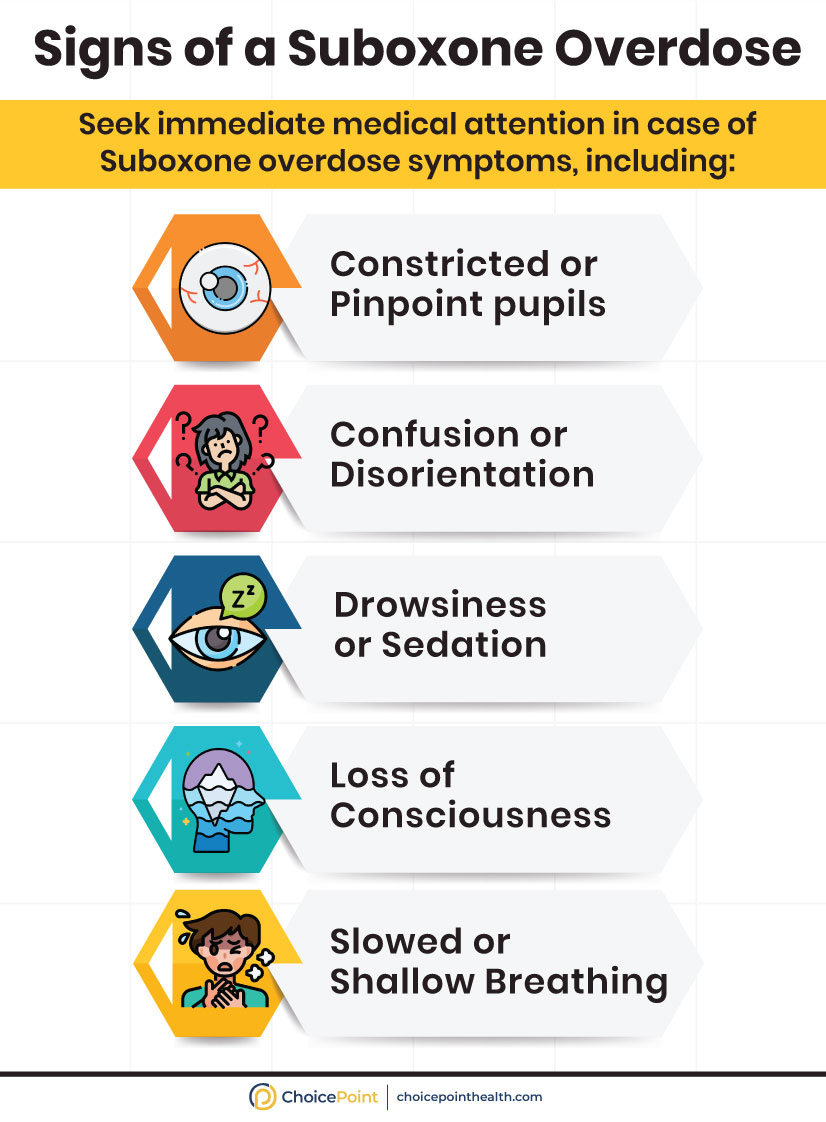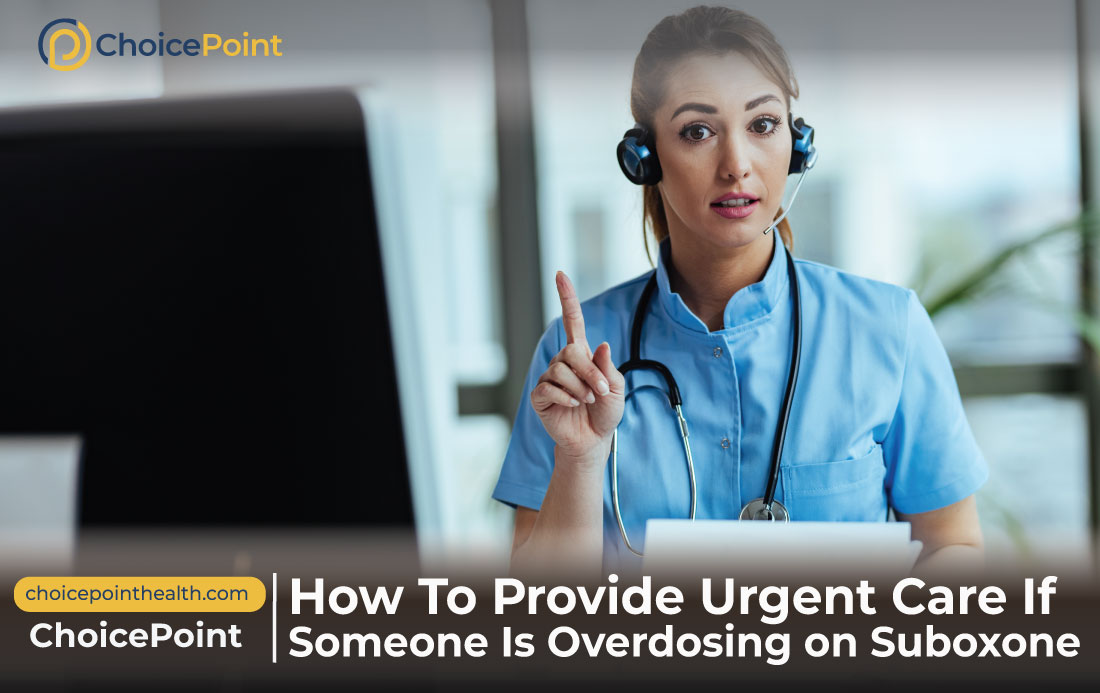For people struggling with opioid addiction, Suboxone may be a ray of hope. Suboxone (Buprenorphine and Naloxone) helps combat opioid dependence. Although quite effective, there are certain risks of Overdosing on Suboxone attached to this FDA-approved medication. Let’s delve into some factors that may contribute to a Suboxone overdose.
Did you know that abruptly stopping Suboxone may also raise the risk of Overdosing on Suboxone? To reduce the risks of severe withdrawal symptoms, contact ChoicePoint addiction specialists and begin a timely medical detox now!
Table of Contents
How To Provide Urgent Care If Someone Is Overdosing on Suboxone
If someone experiences a Suboxone overdose, consider it a medical emergency that must not be taken lightly. If you notice someone displaying signs of a Suboxone overdose around you, you must seek immediate help. Here are some things an individual can do to help someone with a Suboxone overdose:
- Carefully reposition them in the recovery position to keep an unobstructed airway and prevent vomit choking.
- Contact emergency assistance right away.
- Stay with the individual and monitor vital signs such as respiration, pulse, and degree of consciousness.
- Do not leave the person alone until medical personnel come.
- Provide comfort and support to help them stay calm.
How Long Does It Take Suboxone To Kick In
From the moment Suboxone is ingested, typically, it starts to take effect within 30 minutes to 1 hour after it is administered. It goes through several processes before the full effects kick in. Following is a timeline for the Suboxone:
Initial Effects
Individuals may start experiencing initial effects within 20 to 30 minutes after consumption. Suboxone is placed on the tongue from where it enters the body. It is absorbed through the mouth. Initial effects include reduced opioid withdrawal symptoms and cravings.
Full Effects
Suboxone reaches its peak effectiveness in 1 to 2 hours. Buprenorphine continues to be absorbed. Its concentration in the bloodstream gradually increases. The full effects of Suboxone, such as stabilization withdrawal symptoms and reduced cravings, happen within this timeframe.
Naloxone Effect
Naloxone is included in Suboxone to discourage injection misuse. When taken as prescribed under the tongue, naloxone has limited oral absorption and does not significantly impact Suboxone’s overall effects. However, if Suboxone is improperly injected, naloxone can quickly counteract the effects of other opioids. This may trigger withdrawal symptoms.
Overdosing on Suboxone requires proper treatment. At ChoicePoint, our esteemed doctors can help you reduce cravings by providing FDA-approved medication and psychotherapies.

Possible Overdose Risks of Suboxone
Top 3 Causes Of Suboxone Overdose
Are you undergoing Suboxone treatment or supporting someone in recovery? Then, it may be crucial for you to understand the causes behind a Suboxone overdose. By being aware of the factors contributing to an overdose, individuals can take preventive measures, such as adhering to the prescribed dosage, avoiding the combination of Suboxone with other substances, and seeking proper medical supervision and support. Safety should always be a priority, and seeking professional guidance is crucial throughout treatment. Here are the top 3 causes of overdosing on Suboxone:
1. Incorrect Dosage or Misuse
Certain medications must always be taken after consulting a healthcare provider. Suboxone overdose are most commonly caused by taking Suboxone in higher doses than prescribed or using it more frequently than suggested. Due to a common misconception, people feel that taking more Suboxone will increase its effectiveness. However, this is a dangerous assumption. Increasing the dosage without medical supervision increases the risk of respiratory depression, drowsiness, and overdose substantially.
2. Combining Suboxone with Other Substances
When Suboxone is used with other drugs, particularly central nervous system depressants like alcohol, benzodiazepines, or sedatives, overdoses may be common. These substances can intensify Suboxone’s sedative effects, resulting in respiratory depression, central nervous system suppression, and an increased risk of overdose. Combining drugs without medical supervision significantly enhances the dangers associated with Suboxone use.
3. Lack of Medical Supervision and Support
Overdosing on Suboxone can be expected when it is used without sufficient medical supervision. Suboxone treatment should be followed by a comprehensive plan that includes regular monitoring, counseling, and medical assistance. Individuals may overuse or mismanage Suboxone without competent counseling, increasing the risk of overdose. Medical supervision means a lack of access to crucial supplies in an emergency.
At ChoicePoint, you will undergo the administration of Suboxone in a secure environment by credentialed professionals. Call us at 844.445.2563 and seek the help you deserve!
Factors That Affect The Onset of Suboxone’s Effects
It is important to understand that Suboxone may not react similarly for everyone. The onset of Suboxone’s effects varies among individuals. Different factors decide how fast the effects kick in. These factors include;
- Metabolism
- Physiology,
- Prior opioid use
- Dose
- The Severity of Opioid Dependence
- Tolerance level
It can not be denied that delayed recognition or inadequate medical intervention in response to an Overdose of Suboxone can worsen the situation and increase the risk of serious complications or death. Contact our DEA-certified addiction practitioners at ChoicePoint to get prompt medical care!
How ChoicePoint Can Help You or Your Loved Ones Overdosed from Suboxone
A closed one may provide support if an individual is Overdosing on Suboxone; nevertheless, to avoid serious effects, seek help from trained healthcare providers! ChoicePoint is a co-occurring addiction treatment center where our specialists are prepared to provide emergency treatment in case of a Suboxone overdose!
Medical Disclaimer:
ChoicePoint aims to improve the quality of life for people struggling with substance use disorder and mental health issues. Our team of licensed medical professionals research, edit and review the content before publishing. However, this information is not intended to be a substitute for professional medical advice, diagnosis, or treatment. For medical advice please consult your physicians or ChoicePoint's qualified staff.










Review Overdosing on Suboxone? Guide To Provide Urgent Care.